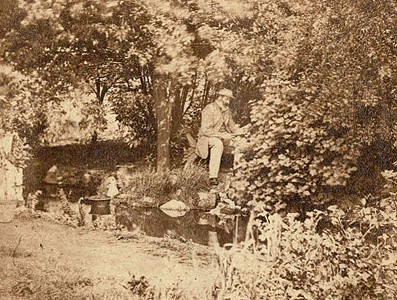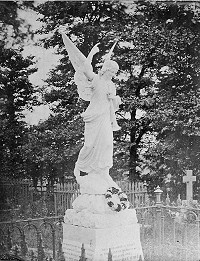William Thomas Kime, barrister

W T Kime in his garden

Kime's memorial, formerly in Keddington
One of the many documents given to us by our late president David Robinson, is an illustrated booklet published in 1864, about the history of Louth, written by William Thomas Kime.
William was the son of a Louth merchant. Born in Louth in 1817, he trained as a barrister in London and worked in the Middle Temple. In 1857, he moved with his wife Mary and three children to live in a house in Walkergate with a long garden that stretched back to the Aswell Stream. This was Walkergate House (now the location of Spring Court in Queen Street), the Kime family residence that had latterly been occupied by his maiden aunts. In Louth, another six children were born to William and Mary, bringing the total to nine.
These are the things I find interesting about William Thomas Kime:
- Kime continued to work in London, despite living in Louth. The reason he could do this must have been the coming of the railway - there were five trains per day from Louth to London, and the journey took only a few hours. Presumably he undertook what would now be called weekly commuting.
- He was a shareholder of the Louth and Lincoln Railway Company, which planned (unsuccessfully) to construct a direct line from Louth to Lincoln.
- Kime’s history of Louth is written in rhyme. Here are a few lines. “Dr Mapletoft, a worthy dean, who first at Louth was taught, / Grateful for this early teaching, scholastic aid for others sought. / So he founded and endowed a Petit Free School of his own, / Monument of gratitude for help in learning he had known.”
- Of the nine Kime children, only the eldest married but he divorced a few years later. The others did not marry. William Thomas and Mary Kime had no grandchildren.
- All three daughters - Mary, Constance and Isidora - became accomplished banjo players.
- William Thomas Kime was a friend of the Greek poet, Andreas Kalvos, and it is probably because of their friendship which started in London, that Mr and Mrs Kalvos moved to Louth.
- When W T Kime died in 1874 he was buried in Keddington, as were Andreas and Charlotte Kalvos in 1869 and 1888, respectively. The remains of Kime were removed to Sussex in 1940, and the Kalvos remains were removed to Greece in 1960.